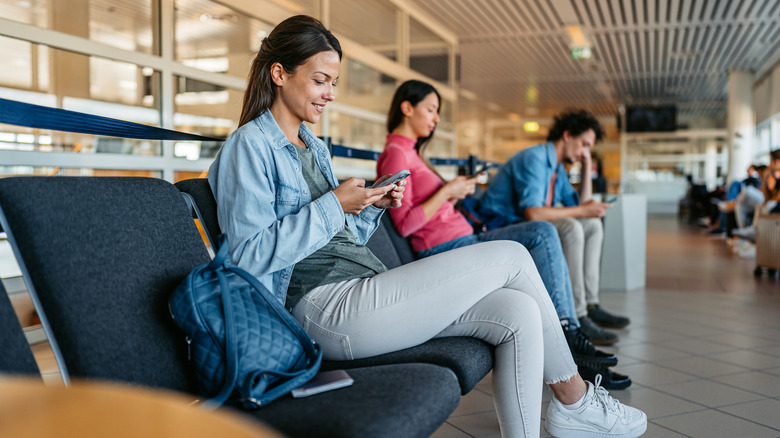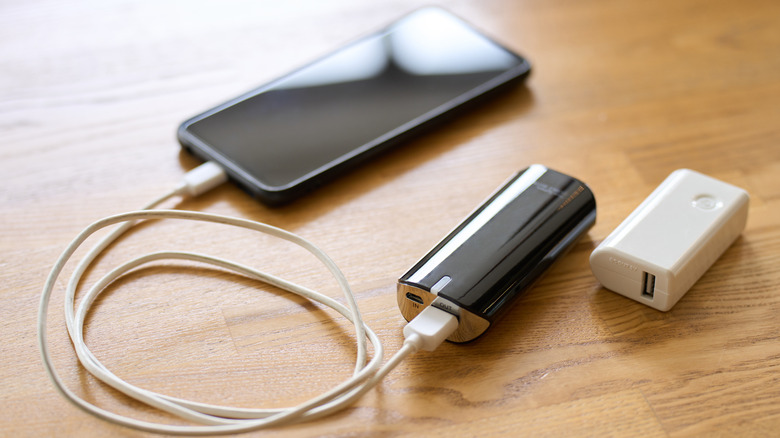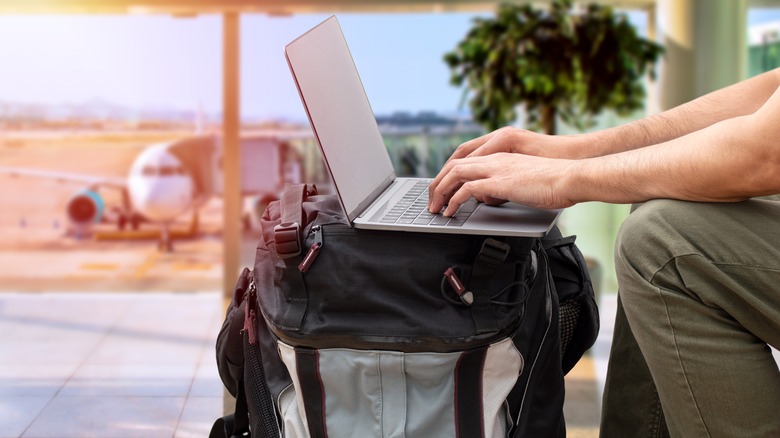The FBI Has An Unsettling Warning For Travelers About Charging Their Phones At The Airport
It happens to the best of people: forgetting to charge your phone before heading out to catch a flight or draining your battery while waiting to board said flight. For added convenience for travelers, it's not uncommon to find USB charging stations at the airport. But before you plug your phone in, here's something to keep in mind. In April 2023, the Federal Bureau of Investigation's (FBI) Denver division sent out a concerning tweet related to this scenario.
They warned, "Avoid using free charging stations in airports, hotels or shopping centers. Bad actors have figured out ways to use public USB ports to introduce malware and monitoring software onto devices." Simply put, plugging your phone into this public USB charging station could potentially lead to the theft of your personal and private information. This is due to the fact that USB cables also permit the transfer of data. What the FBI is referring to is called juice jacking and it's important to note that this can occur on all other USB-compatible devices.
Although some experts don't believe juice jacking is that big of a threat, others disagree. This includes Adrianus Warmenhoven. The cybersecurity expert spoke to Forbes shortly after the FBI published their tweet. He emphasized the effortlessness of USB charging station manipulation. However, making sure this doesn't happen to you or anyone else in the first place is just as straightforward.
Here's how to avert falling victim to juice jacking
The Federal Communications Commission (FCC) states that there have been no reports of juice jacking incidents. Despite this, the reality is that juice jacking can happen, and as such, it's important to be safe rather than sorry while traveling. There are items you're probably packing but should buy instead, but a portable charger isn't one of those things. So you don't have to resort to using USB charging stations at the airport, always pack a portable charger or wall charger in your carry-on or personal item.
The former is an essential that should be at the top of your packing list. Portable chargers are extremely affordable and can guarantee that you never run out of battery during your travels. Likewise, power outlets cannot be utilized in juice jacking, so you can plug in your wall charger worry-free. And although packing chargers can be a pain, there are hacks to ensure that there are no tangles.
Let's say you have no other way to charge your phone and must use a public USB charging station. If this is the case, cybersecurity expert Chris Wysopal explained to AARP, "Locking your phone shuts off data over the USB port so that attacks are pretty much impossible." For further protection, always make sure your device and its apps are up to date. In his interview with Forbes, Adrianus Warmenhoven suggested a USB data blocker. You plug your USB charging cable into the data blocker before plugging it into the public charging port to prevent juice jacking.
Travelers might also want to avoid the airport's public Wi-Fi
If you happen to use a public USB charging station at the airport or anywhere else and are worried you may have been juice jacked, here's what to look out for. "If your phone starts working unusually slowly or it feels hotter than usual, chances are you may have picked up malware," explained Adrianus Warmenhoven to Forbes. The same can be said about a fast draining battery. If you notice these symptoms, be on the lookout for transactions or account logins that you did not enact. Alternatively, you could invest in a service such as LifeLock by Norton that notifies users of identity theft and more.
With all that said, travelers should also be wary of airport Wi-Fi. Similar to USB charging stations, airport Wi-Fi, or any other public Wi-Fi, can be used to conduct data theft. It's for this reason travel expert Samantha Brown doesn't trust this free service. A study conducted by Forbes in 2023 found that 40% of individuals stated that public Wi-Fi had led to a breach in their data. Moreover, the study also revealed that one of the places that this primarily transpired was airports.
If you frequently use public Wi-Fi or are a seasoned traveler, purchase a VPN (virtual private network). This allows users to surf the web without the threat of their information getting compromised. Another word of advice? Refrain from using online banking apps, inputting credit cards, and more on public Wi-Fi.


